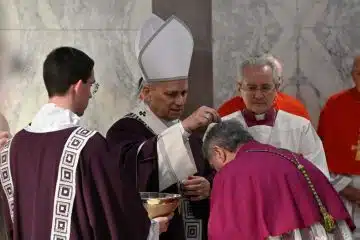Catholic farmers share gifts and challenges of rural life
January 20, 2012
By Anna Robertson
ARCHDIOCESE — Rural life is very much a part of the Archdiocese of Cincinnati, and the St. Martin Deanery Catholic Rural Life Conference, which serves Adams, Brown, Clinton, Highland, and a portion of Clermont counties, seeks to make a number of Catholic social teaching principles relevant for the people living in those communities, particularly farmers.
This mission is also reflected also through a group that meets in the St. Marys and Sidney deaneries, as well as a statewide Ohio Catholic Rural Life Conference. All groups receive support from the National Catholic Rural Life Conference, headquartered in Des Moines, Iowa.
Among the principles the groups promote are care for God’s creation, subsidiarity, and solidarity. In the U.S. Catholic bishops’ pastoral letter, “For I Was Hungry and you Gave Me Food: Reflections on Food, Farmers, and Farmworkers,” the bishops explain that “All of us, especially those closest to the land, are called to a special reverence and respect for God’s creation.”
They also inform us that subsidiarity “defends the freedom of initiative of every member of society.” This principle, which is mentioned as far back as Pope Pius XI’s Quadrigesimo Anno encyclical in 1931, teaches that we should first seek to achieve the common good on a smaller, local level. And thirdly, we are reminded that solidarity is the “understanding that as children of God we are all brothers and sisters, no matter how different or distant we may seem.”
Pat Hornschemeier, who chairs the St. Martin Deanery Catholic Rural Life Conference, described the role of the conference as being “to promote local foods, to try to enhance communication between the rural areas and the city, and to encourage people to know where their food comes from, and that it comes from somebody who is taking care of creation.”
While the connections between subsidiarity, solidarity and care for God’s creation may not always be immediately apparent, a glimpse into the lives of an often overlooked group of people in society, small farmers, can bring the interconnectedness of these values to life.
Jim and Patty Schwartz are one example of a farm family in the Archdiocese of Cincinnati who participates in the St. Martin Deanery Rural Life Conference. Cradle Catholics who organically grow vegetables, meat and eggs, they have farmed the 40 acres of Back Acres Farm in Brown County for decades. They sell their produce at several markets in the Cincinnati area.
“We are interested in taking care of what God has given us,” Patty Schwartz remarked. “Everything is just a gift from God.”
In the face of consolidation and concentration, it is becoming ever more difficult to earn a living as a small farmer, they explained. “When you farm, you buy your job,” Patty Schwartz said, rattling off a list of up-front expenses, including the building, land and equipment.
According to the U.S. bishops’ letter, the number of farms nationwide has been cut in half since 1950, with 10 percent of these farms producing 70 percent of our food. The increasing concentration in all aspects of agriculture is a daunting challenge for small farmers, who often find profitability hard to come by. The government subsidies intended to address this problem often go to large-scale operations, and the hoops through which small farmers must jump, created with large operations in mind, can be paralyzing. Jim Schwartz remembers facing both of these problems early on; he was spending more money than he could make in profits, and the farm programs of the government were not helping because the farm was so small.
Today, with farmers markets cropping up in towns small to large across the country, it is increasingly easy to notice the farmers behind the food. Markets offer opportunities to experience subsidiarity in action as entrepreneurial producers proactively find ways to sell face to face to their own customers. At the same time, the principle of solidarity expresses the need for us to take responsibility for the well-being of others, and so we who depend on small farmers for our food are called to take informed responsibility for their livelihood as they take informed responsibility for our own, responding to our needs and desires and filling our stomachs with nutritious food. As the bishops state, “In the case of agriculture, solidarity and subsidiarity lead us to support and promote smaller, family-run farms, not only to produce food, but also to provide a livelihood for families and to form the foundation of rural communities.”
Another important aspect of Catholic Rural Life is ministering to rural families’ spiritual needs. The St. Martin Deanery does this each year through regular prayers at all meetings, offered by Father Dohrman Byers, pastor of St. Mary in Arnheim; St. George in Georgetown; and St. Michael in Ripley, as well as annual farm Masses that are usually celebrated in the deanery on a farm family’s property.
Jim Schwartz laughingly commented that he has been called a “roaming Catholic.” He always goes to church on Sunday, but he’ll float from parish to parish, contributing to the collection wherever he is. He believes the Catholic family, urban and rural alike, is larger than any one parish.
“I’m a Catholic. There are other Catholics. I live in the country. They live in the city,” he said. “We have (our Catholic faith) in common, and we can help each other. We should value that.”
“I love being Catholic. I feel very fortunate to have been born into a Catholic situation,” Patty Schwartz added. As farmers, “we try to always be stewards of the land … We try to build our earth up.”
She emphasized the need to encourage people to support family farmers because “there may be a point at some time in the future not too far away where we are their source of food, and we need to be viable.”
Patty Schwartz applies the Golden Rule to animals and the earth, too. “The earth gives us so much. If we don’t give back to it, it’s going to stop giving to us, too.”
Tony Stieritz, director of the archdiocesan Catholic Social Action Office, which oversees Catholic rural life in the archdiocese, reflected on the interconnectedness between rural life and the social mission of the Catholic Church: “As the human family seeks to establish a more loving connection with the earth, we are also called to promote the preservation of the individual family farm in our social order and to cultivate once again the solidarity between urban and rural. By respecting subsidiarity, living in solidarity with one another and caring for God’s creation, we can promote the authentic human development through which we plant seeds for the kingdom to come.”
Anyone who is interested in attending a St. Martin Deanery Rural Life Conference meeting may join the group on the second Tuesday of even-numbered months, or by contacting the conference chairperson, Patrick Hornschemeier, at 937-378-4769.
For more information on National Catholic Rural Life, visit www.ncrlc.com. To read the U.S. bishops’ full statement on agriculture, visit http://nccbuscc.org/ bishops/agricultural.shtml.
Robertson is a Catholic Campaign for Human Development intern with the Archdiocese of Cincinnati and a student at Xavier University.













